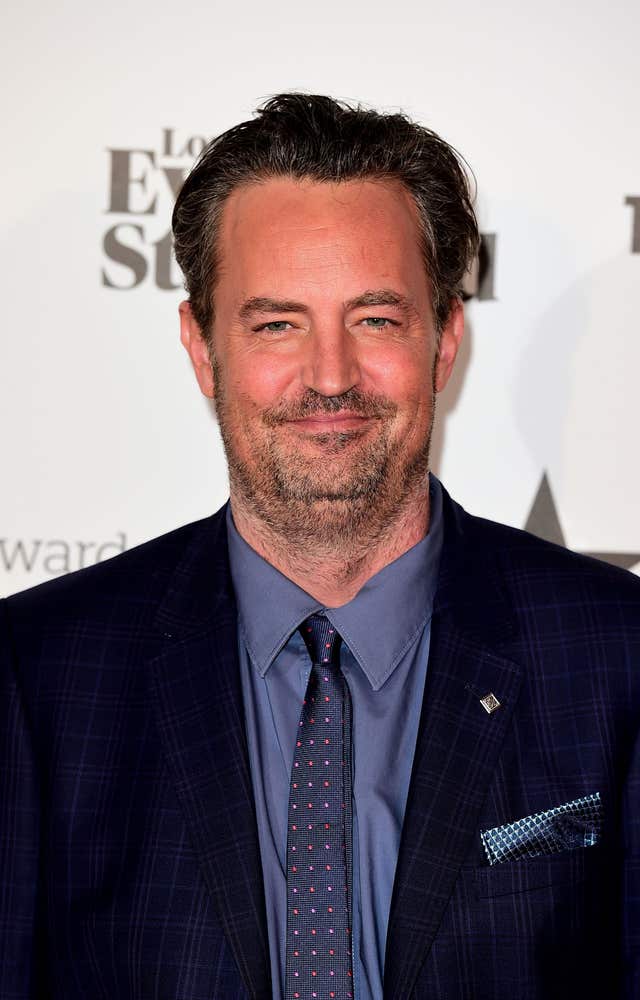Matthew Perry was very lonely, mother says on first anniversary of death
Perry died from the ‘acute effects of ketamine’ in autumn last year after he fell back into addiction.

The mother of actor Matthew Perry has spoken of how “very lonely” her son had been throughout his life as the first anniversary of his death at the age of 54 was marked.
Perry, who played Chandler Bing in hit US sitcom Friends, died from the “acute effects of ketamine” on October 28 after he fell back into addiction.
An investigation unearthed a “broad underground criminal network” of people who “took advantage” of the American-Canadian actor, who set up a sober living facility for men with similar issues.
The first of five people charged over Perry’s death will be sentenced on Wednesday.
In an interview to mark the first anniversary of his death, his mother Suzanne Morrison told NBC’s morning talk show Today that she was “thrilled” by the charges over his death.
She also indicated that she was aware of him struggling as the result of the “new medication”, ketamine, which court documents say Perry was first given to treat his depression.
His stepfather, the Dateline NBC journalist Keith Morrison also said: “What I’m hoping, and I think the agencies that got involved in this are hoping, that people who have put themselves in the business of supplying people with the drugs that will kill them, that they are now on notice.
“It doesn’t matter what your professional credentials are, you are going down, baby.”
Ms Morrison also said: “It must be said, he was very lonely in his soul.”
“I’m a very lucky woman, but there was one glitch, there was one problem that I couldn’t.. conquer it (his addiction), I couldn’t help him,” she added, breaking down emotionally.
“The one thing I have to learn, (it’s) very hard… is you’ve got to stop blaming yourself because it tears you up.”

While tearful, and launching the addiction charity Matthew Perry Foundation of Canada with her other family members including her daughters, Ms Morrison also said that she worries that if deaths from overdoses do not stop, then “we’re going to lose so many (millions) of people”.
“I have more freedom of (maintaining) a relationship (with Matthew) now than I ever did,” she said.
As his wife shook her head, appearing to disagree, Mr Morrison said he “didn’t know how much he was taking”, and had believed he was sober.
He also said that he had thought it had not “turned into something that he couldn’t control”, and admitted that Perry’s “exterior hid an insecure, often very sad guy”.
The expansion of the foundation, first began in November last year, sees his sister Caitlin Morrison as the executive director, and their mother sit on the board.
She said that they “were always proud” as he “kept fighting” Perry’s drug addiction.

During the last few weeks of his life, Perry “turned to street dealer” Erik Fleming who is said to have sourced ketamine from Jasveen Sangha – named by authorities as “the ketamine queen”.
The ketamine allegedly supplied by Sangha was ultimately the dose that took Perry’s life, a Drug Enforcement Administrator claimed.
On August 8, Fleming pleaded guilty to conspiracy to distribute ketamine and distribution of ketamine resulting in death.
Sangha is to face a trial on March 4 next year, alongside Salvador Plasencia, a doctor who allegedly used Perry’s live-in assistant Kenneth Iwamasa to distribute ketamine to the actor from September to October last year.
Iwamasa pleaded guilty on August 7 to conspiring to distribute ketamine causing death – admitting to “repeatedly injecting Perry with ketamine without medical training” – with his sentencing set for November 6.
Meanwhile, another doctor named Mark Chavez became the last defendant to admit to conspiring to distribute the surgical anaesthetic ketamine following the death of Perry.
His sentence hearing was scheduled for April 2 2025.
Perry had been seeking treatment for depression and anxiety when he became addicted to intravenous ketamine, turning to allegedly “unscrupulous doctors who saw Perry as a way to make quick money”, US attorney Martin Estrada said.
Ketamine is a sedative that can be used as a recreational drug, as well as to treat depression and pain management.





